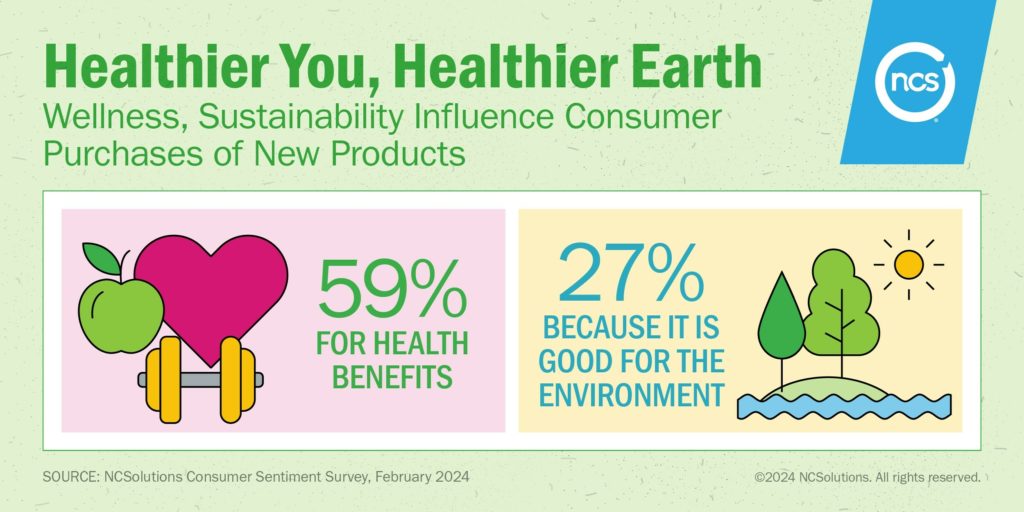More than half of consumers (55%) say they’re more likely to try a new product if it’s marketed as aligned with a healthier and more sustainable lifestyle, according to a new survey.
The study carried out by NCSolutions (NCS), the company dedicated to improving advertising effectiveness for the consumer packaged goods (CPG) ecosystem, found that six in 10 American consumers (59%) recently purchased a new product because of its health benefits. Nearly half (47%) of consumers said they’ve specifically purchased a food or beverage product in the last 30 days to get more vitamins or nutrients, while 33% buy to improve sleep and 29% to support gut health. More than one in four Americans (27%) purchased a new product because it is good for the environment.
Since the first Earth Day in 1970, eco-friendly products, such as laundry detergent using sustainable packaging, have been designed and marketed to earth-conscious consumers. Functional (or fortified) foods, which involve modifying or enhancing the nutrients of conventional foods for added health benefits beyond basic nutrition, are also a growing trend. Examples of functional foods include vitamin-enriched water or low-carb bread.
EMBRACING A HEALTHIER YOU, HEALTHIER EARTH MOVEMENT
Younger generations are more likely to consider the effect of their food or beverage product choices on the environment than older generations, noted the study. In fact, 48% of Gen Z and 44% of millennials consider this effect always or often, compared to 33% of Gen X and 29% of boomers. Likewise, younger consumers factor in the effect on the environment of their choice of laundry or cleaning products more often than older consumers. Fifty-one percent of Gen Z and 41% of millennials consider this effect always or often, compared to 33% of Gen X and 35% of boomers.
“The movement toward a ‘healthier you, healthier Earth’ has only accelerated over the last decade, driven by factors such as an aging population, consumers’ growing interest in convenience and advances in nutrition,” shared Alan Miles, CEO of NCSolutions. “There’s greater awareness and concern, especially among younger consumers, about their own health and the planet’s health. As our findings show, consumers continue to factor well-being and sustainability into their purchase decisions, which is a powerful and positive message for CPG brands to hear on this Earth Day.”

SUSTAINABLE IMPACT ON BRAND LOYALTY
The research also found that around half (47%) of consumers say that when they see a brand advertising products they typically buy, they’re more likely to keep that brand in mind the next time they shop. Additionally, if a brand’s mission aligns with the consumer’s values, 58% say they’re very or completely likely to buy that brand’s product. When a CPG brand’s healthy and sustainable marketing message syncs with a consumer’s values and preferences, 42% say it enhances their overall positive brand perception.
However, controversial stands from a brand can also backfire: 28% of Americans prefer to keep controversies out of the shopping cart, while 19% only like it when the brand agrees with their own.
“As preferences evolve, health and sustainability have become non-negotiable social pillars for some consumers,” shared Dan Malmed, Chief Revenue Officer of NCSolutions. “The NCS consumer sentiment survey results demonstrate that emphasizing healthy and sustainable values highly influences how consumers feel about a brand. By prioritizing these important product attributes, CPG brands can not only meet market demands, but they can also drive long-term growth and be more relevant in an increasingly conscious marketplace.”
HEALTHIER OPTIONS FOR EARTH
When shopping for laundry or cleaning products, 40% of consumers say they always or often consider the effect of their product choice on the environment, and 37% say they consider these attributes when shopping for skin care products and food and beverages.
How often are consumers considering these healthy and sustainable purchase factors? In 2023, the average purchase cycle for household care products ranged between 75 – 93 days, according to NCS’ proprietary CPG purchase data. Laundry detergent was purchased every 75 days, on average, and bleach and bathroom cleaners had longer purchase cycles, 93 days and 91 days, respectively. In the skincare category, American households purchased facial cleanser and body lotion once every quarter, while they purchased sunscreen every 53 days.
“CPG brands that embrace sustainability and healthy living as an ongoing practice can expect to find and connect with like-minded consumers, according to the sentiment expressed in the latest survey,” noted Deirdre McFarland, SVP of Marketing and Communications at NCSolutions. “By authentically aligning with consumer values, brands have the power to cultivate lasting brand loyalty, drive incremental sales as well as shape a brighter and more sustainable future––a win-win for all.”
CONSCIOUS CONSUMERS
The research also found that health- and eco-conscious consumers are most influenced to buy a wellness or sustainable product after seeing it advertised on TV and ad-supported streaming (44% of Americans), followed by social media (39%) and internet/website display ads (37%).
Celebrity and social media influencers can also hold sway over consumer purchase decisions. However, the impact of endorsements is split – 55% of consumers are at least somewhat likely to try a product that improves well-being or the environment when there is a celebrity or social media influencer involved. In comparison, almost a quarter of Americans (24%) are not influenced by a celebrity or social media influencer who endorses a healthier you or healthier for the environment product.
Consumers are most likely to purchase products that support a healthier you or healthier earth at the grocery store (67%), via a website (39%), or in a drug store (39%).
Click here to download the full report.





































